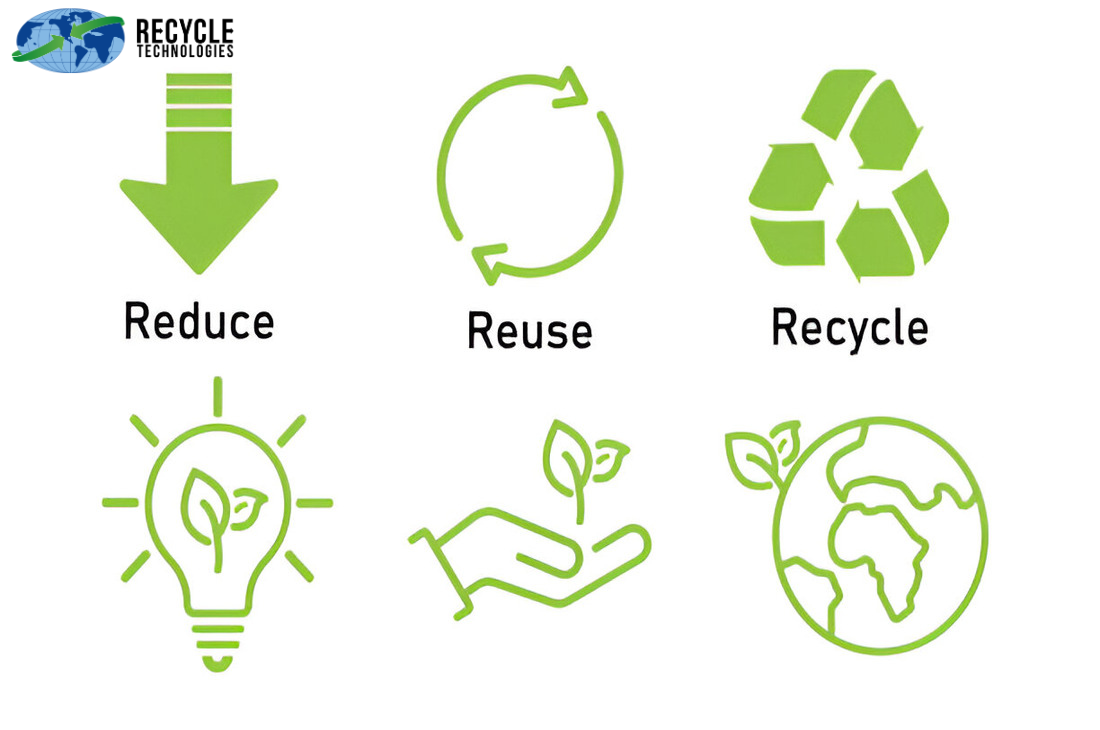Whenever we hear the term recycling waste, we often hear the term circular economy thrown here and there without fully understanding its meaning. The circular economy is all about “reduce reuse recycle” e-waste. However, recycling companies play a more significant role in achieving a perfect circular economy. The public can also help do their part. By recycling more spent electronics, they too can help reduce carbon emissions. We are in this together. Let's Reduce Reuse Recycle together.
Recycle Technologies Incorporated (RTI) is one such contender: a midwest-based, minority-owned e-waste and fluorescent lamp recycling business with big plans to achieve a circular economy. With licensed facilities in Minnesota and Wisconsin, we offer a wide range of services and therefore can schedule local commercial pick-ups or accept residential drop-offs. Additionally, our mail-in program allows us to service customers across the country.
What is a Circular Economy, and How it Helps?
Recycling aims to get to the end of the e-waste process. The circular economy, however, takes us right back to the beginning. The concept of a circular economy aims to radically transform how we produce, consume, and dispose of products and materials. The goal is to move out from the traditional linear “take-make-waste” model to a closed-loop system naturally associated with conventional recycling. This keeps resources in use for as long as possible while regenerating natural systems.
On the other hand, the circular economy is often incorrectly reduced to the well-known Reduce Reuse Recycle strategy. Andrew Morlet, CEO of the Ellen MacArthur Foundation, said in 2020 at a Leading Disruption Panel, “Recycling alone will not save us.” The circular economy is a “bigger idea” that calls for a major reorganization, one that will need us to reconsider our methods since the advent of the steam engine.
A circular economy improves the quality and quantity of valuable commodities recovered from waste, decreases the need for extraction, raises the market for recovered resources, and generates new employment and learning possibilities, all of which contribute to a flourishing economy.
What are RTI’s Efforts to Reduce Reuse Recycle Initiative?
RTI has been actively involved in upholding all the necessary changes needed to amend the recycling process since our inception in 1993. A great example of e-waste management policies we apply includes our involvement in the Association of Lighting and Mercury Recyclers (ALMR) and AAA Naid certifications. These certifications reaffirm customers' trust in us when it comes to recycling. We focus on professional, personal, and proactive service and a desire to improve green methods and earth-friendly processes to achieve our mission of “reduce reuse recycle.”.
Some of the policies we are actively trying to achieve include the following efforts. All these bring about the circular economy of recycling goods which we need as soon as possible:
Recovering Valuable Materials
We realize that our centers recover vast amounts of valuable materials from discarded products and waste. Plastics, metals, glass, paper, and more are sorted, processed, and turned into recycled feedstock. These materials can then be manufactured into new products, closing resource loops in their domains. At RTI, it is our prime effort to extract the maximum value from disposed items before they hit landfills.
Reducing Raw Material Usage
By creating recycled material feedstock, we hope to greatly reduce the need for new resource extraction. It is why we are trying to reuse secondary recycled materials as much as we can. These secondary recycled materials cause less pollution and disturbance to natural habitats compared to mining raw materials every time we require any electronic equipment. Using recycled items takes far less energy to reprocess, reducing ecological impacts across the production chain.
Implementing Sustainable Product Design
Knowing that our facilities can recover commodity materials later on enables manufacturers to design sustainable products from the start. We are maximizing our efforts to avoid toxic ingredients, use pure materials instead of alloys, and optimize products for disassembly and recycling. This eco-design has already shown us how circularity can be achieved.
Enhancing Recycling Market
Our efforts directly supply secondary materials needed to develop robust recycling markets. These recycled material streams allow manufacturers to scale the production of goods made from recycled content. Strong markets for recycled materials also encourage further recycling, thereby establishing a self-sustaining cycle.
Enhancing New Business Models
We believe that once we achieve a fully recycling market, we can take one step ahead and transition to circular business models. We already have a take-back program where products are returned for recycling. The program helps optimize designs, utilize recycled materials, and recover commodities. Even though we provide our reuse reduce recycle services, any recycling company thinking of expanding its horizons can look into leasing or service-based models to capture useful resources.
Data & Reporting for Transparency
Recycling facilities provide verified data on the types and volumes of materials recovered. This gives companies clear metrics to include in sustainability reporting. Data supports regulatory compliance and helps identify areas for improving recycling performance. All of this transparency supports circularity.
Also Read: Appliance Recycling: Why Reusing is Better Than Replacing
Reduce Reuse Recycle – Look Ahead
A circular economy is imperative for the shift to a sustainable future where recycling makes a sum-zero impact on the environment. Recycling companies already embody this closed-loop ethos, still, there is always room for improvement.
We at RTI are improving ways to utilize discarded products and waste into recycled materials for manufacturing new goods, with minimum waste. We will continue serving as linchpins of the circular economy through material recovery, data tracking, collaborative partnerships, and supporting circular design, which makes us an ideal choice if you have to dispose of e-waste responsibly.
Call us at MN: (800)305-3040 and WI: (800)969-5166, or avail yourself of a free quote here today to help us achieve reduce reuse recycle.












